人教版(2019)选择性必修 第一册Unit 2 Looking into the future Using language Ⅰ 课件(共16张PPT,内镶嵌音频)
文档属性
| 名称 | 人教版(2019)选择性必修 第一册Unit 2 Looking into the future Using language Ⅰ 课件(共16张PPT,内镶嵌音频) | 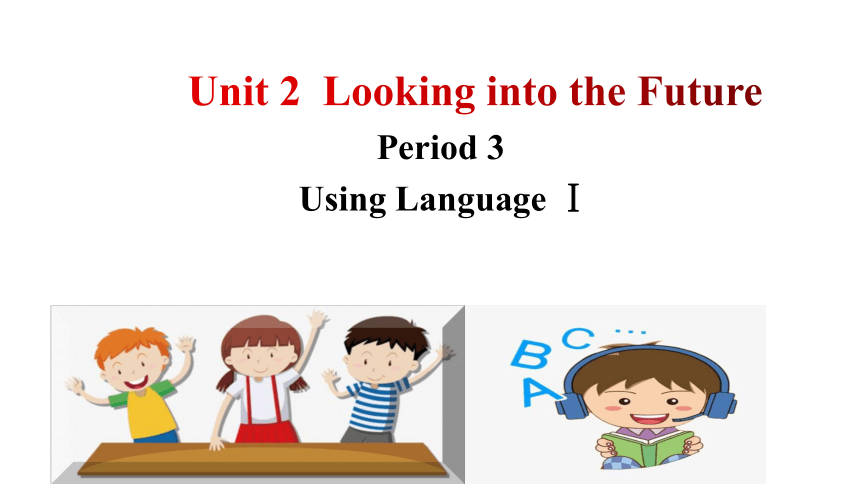 | |
| 格式 | pptx | ||
| 文件大小 | 1.2MB | ||
| 资源类型 | 教案 | ||
| 版本资源 | 人教版(2019) | ||
| 科目 | 英语 | ||
| 更新时间 | 2024-11-21 12:21:19 | ||
图片预览

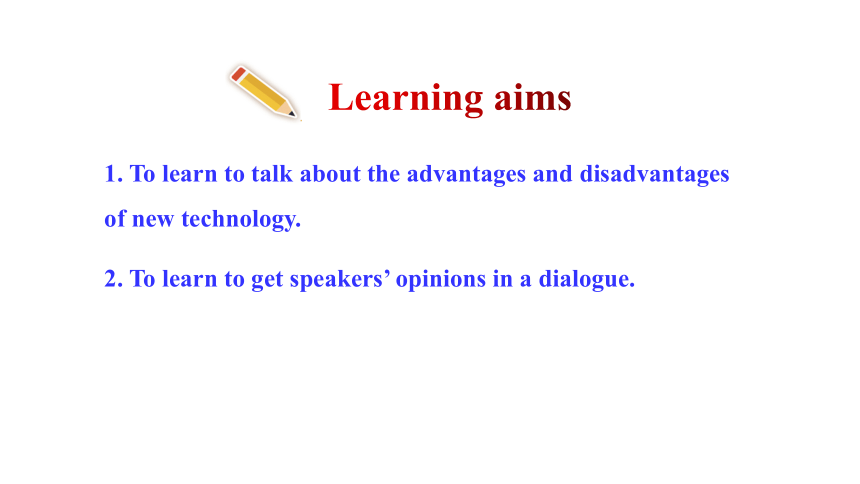
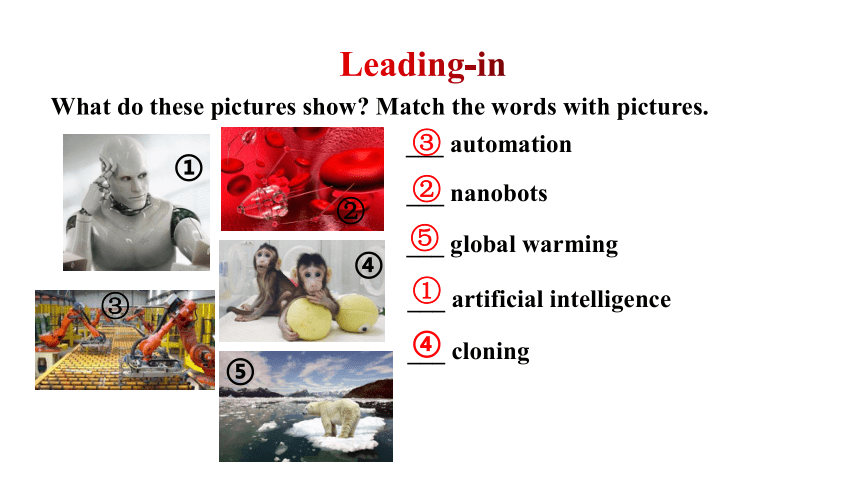
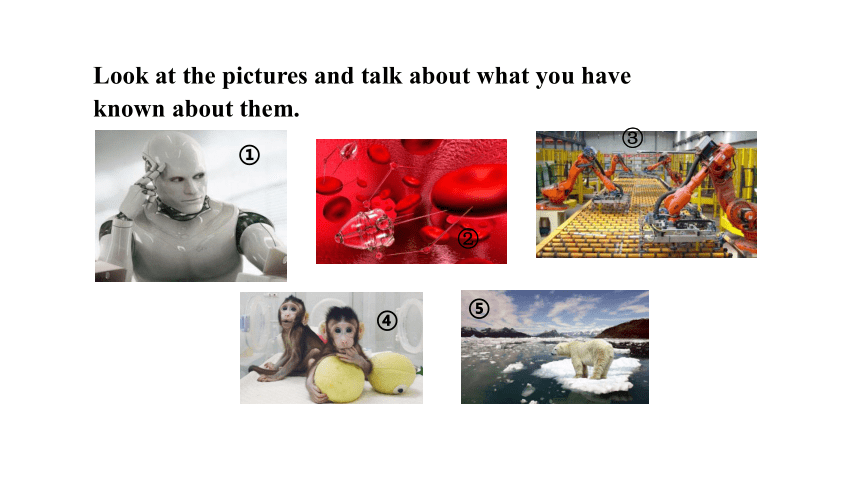

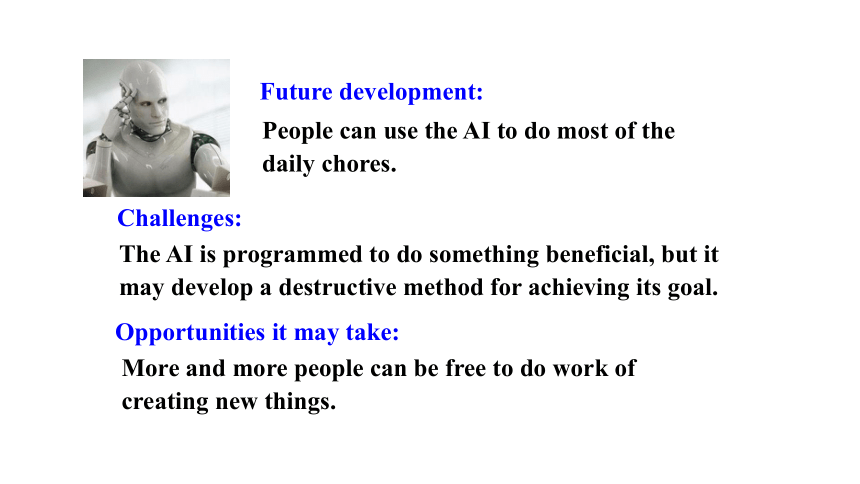
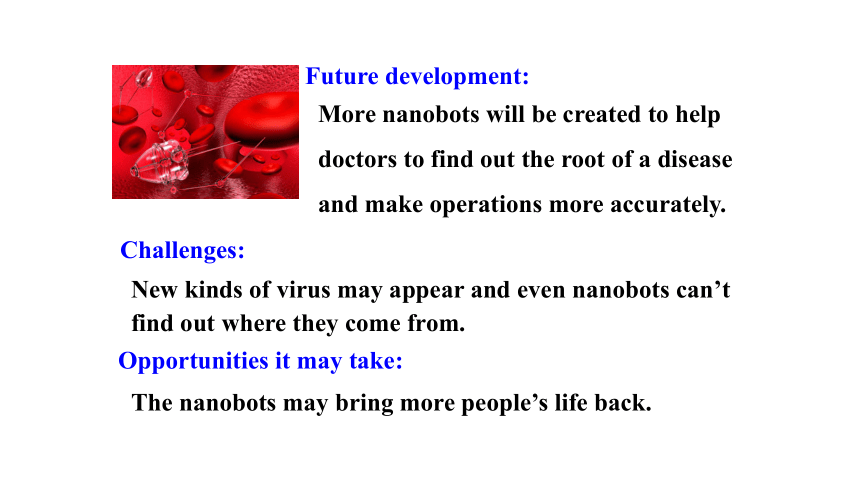
文档简介
(共16张PPT)
Period 3
Using Language Ⅰ
Unit 2 Looking into the Future
Learning aims
1. To learn to talk about the advantages and disadvantages of new technology.
2. To learn to get speakers’ opinions in a dialogue.
What do these pictures show Match the words with pictures.
___ automation
___ nanobots
___ global warming
___ artificial intelligence
___ cloning
②
③
④
⑤
③
②
⑤
①
④
①
Leading-in
Look at the pictures and talk about what you have known about them.
②
③
④
⑤
①
Discuss these questions in groups.
1. How do you think these events or such technology might develop in the future
2. What challenges might they bring
3. What opportunities might they bring
Pre-listening
Future development:
Challenges:
The AI is programmed to do something beneficial, but it may develop a destructive method for achieving its goal.
Opportunities it may take:
People can use the AI to do most of the daily chores.
More and more people can be free to do work of creating new things.
Future development:
Challenges:
Opportunities it may take:
More nanobots will be created to help doctors to find out the root of a disease and make operations more accurately.
New kinds of virus may appear and even nanobots can’t find out where they come from.
The nanobots may bring more people’s life back.
Future development:
Challenges:
Opportunities it may take:
Work in factories will be more efficient. More labor force can be freed from working.
More and more workers will be out of work.
People will learn more about how to create a machine and how to operate it to help work.
Future development:
Challenges:
Opportunities it may take:
More animals even human beings will be cloned.
Cloning may result in disorder on the earth.
More lives will be saved and more diseases can be cured.
Future development:
Challenges:
Opportunities it may takes:
Air pollution will be decreasing. There will be glaciers again in the Arctic Ocean.
There may be other threats to the Polar bears.
People can live in harmony with the Polar bears.
Task: Listen to the radio interview with Dr Han and Vincent Black giving their predictions about the future, and then fill in the table below.
Name Occupation Prediction
Dr Han
Vincent Black
Listening and Speaking
a computer
scientist
Computers will be cleverer than us. People will be
also programming computers like humans; we’ll be
programming them not to think like humans; we’ll
also be creating machines to help people internally.
an architect
There will be cities floating on water and people
could move into housing in cities that float.
Listen for predictions
When listening for predictions, you should listen for the use of the future tense, in particular the future tense with will or will be doing. Words such as predict, prediction and forecast, are also used quite often when making predictions.
Host: On today’s episode of “Future Changes”,we talk with two experts from different fields, Dr Han and Vincent Black, to hear their predictions about the future. First, Dr Han, could you please tell our audience what you do
Dr Han: Certainly. I’m a computer scientist.
Host: And could you please tell us your prediction
Dr Han: Yes, well, I forecast that computers will be cleverer than us in the future. I think that people will also be programming computers to think like humans.
Host: That’s very interesting, but aren’t you worried that such computers would be dangerous
Dr Han: Not at all. This is because we’ll be programming them to not think in ways that may harm humans. In fact, we’ll also be creating machines to help people internally. For example, I think scientists will put some small intelligent machines, called nanobots, inside our bodies to increase our abilities.
Listening text
Host: Wow! That would make each one of us superhuman! And Vincent, could you please tell us about your job
Vincent Black: Certainly. I’m an architect. I design buildings.
Host: And what is your prediction about the buildings of the future
Vincent Black: It’s about the cities of the future, actually. I believe that cities floating on water are part of the world's future.
Host: Oh, really What might make us want to do that
Vincent Black: Yes. With global warming causing polar ice to melt, the sea level rising by many metres is a very realistic prospect. Instead of moving people away from the sea, I think that people could move into housing in cities that float.
Host: That sounds very innovative. Could you please give us more details
Vincent Black: Sure. Well, I’ve developed a plan by designing a city that borrows many ideas from the giant water lily, a flower that floats on water. Moreover ...
1. Work in pairs, and discuss whether Dr Han and Vincent Black’s predictions are possible and why or why not
I think Dr Han’s prediction is puters can never be cleverer than us. Because they are programmed by humans.
I think Vincent Black’s predication is likely to happen, because of global warming, the sea level is rising. Some places will be flooded and the land is getting smaller. Hence, it is a good idea to build houses above the sea.
Post listening
Making predictions
I think/believe/predict that in the future…
My prediction is that…
By 2030, we will…
In the (distant) future there will…
I can imagine/forecast…
I doubt/don’t think that…
One challenge will be…
We will have the opportunity to…
We will be doing…
We are going to…
2. Imagine that you have a job that makes you an expert in the future. In pairs, interview each other about your jobs and predictions. Use the expressions in the box to help you.
Tips
1. Write down the job you may do in the future;
2. What do people do with the job now
3. What do you think people will do with the job
in the future
4. Why do you have the prediction
Continue to play the function of life, is the life of life.
不断发挥生命功能,才是活着的人生。
Period 3
Using Language Ⅰ
Unit 2 Looking into the Future
Learning aims
1. To learn to talk about the advantages and disadvantages of new technology.
2. To learn to get speakers’ opinions in a dialogue.
What do these pictures show Match the words with pictures.
___ automation
___ nanobots
___ global warming
___ artificial intelligence
___ cloning
②
③
④
⑤
③
②
⑤
①
④
①
Leading-in
Look at the pictures and talk about what you have known about them.
②
③
④
⑤
①
Discuss these questions in groups.
1. How do you think these events or such technology might develop in the future
2. What challenges might they bring
3. What opportunities might they bring
Pre-listening
Future development:
Challenges:
The AI is programmed to do something beneficial, but it may develop a destructive method for achieving its goal.
Opportunities it may take:
People can use the AI to do most of the daily chores.
More and more people can be free to do work of creating new things.
Future development:
Challenges:
Opportunities it may take:
More nanobots will be created to help doctors to find out the root of a disease and make operations more accurately.
New kinds of virus may appear and even nanobots can’t find out where they come from.
The nanobots may bring more people’s life back.
Future development:
Challenges:
Opportunities it may take:
Work in factories will be more efficient. More labor force can be freed from working.
More and more workers will be out of work.
People will learn more about how to create a machine and how to operate it to help work.
Future development:
Challenges:
Opportunities it may take:
More animals even human beings will be cloned.
Cloning may result in disorder on the earth.
More lives will be saved and more diseases can be cured.
Future development:
Challenges:
Opportunities it may takes:
Air pollution will be decreasing. There will be glaciers again in the Arctic Ocean.
There may be other threats to the Polar bears.
People can live in harmony with the Polar bears.
Task: Listen to the radio interview with Dr Han and Vincent Black giving their predictions about the future, and then fill in the table below.
Name Occupation Prediction
Dr Han
Vincent Black
Listening and Speaking
a computer
scientist
Computers will be cleverer than us. People will be
also programming computers like humans; we’ll be
programming them not to think like humans; we’ll
also be creating machines to help people internally.
an architect
There will be cities floating on water and people
could move into housing in cities that float.
Listen for predictions
When listening for predictions, you should listen for the use of the future tense, in particular the future tense with will or will be doing. Words such as predict, prediction and forecast, are also used quite often when making predictions.
Host: On today’s episode of “Future Changes”,we talk with two experts from different fields, Dr Han and Vincent Black, to hear their predictions about the future. First, Dr Han, could you please tell our audience what you do
Dr Han: Certainly. I’m a computer scientist.
Host: And could you please tell us your prediction
Dr Han: Yes, well, I forecast that computers will be cleverer than us in the future. I think that people will also be programming computers to think like humans.
Host: That’s very interesting, but aren’t you worried that such computers would be dangerous
Dr Han: Not at all. This is because we’ll be programming them to not think in ways that may harm humans. In fact, we’ll also be creating machines to help people internally. For example, I think scientists will put some small intelligent machines, called nanobots, inside our bodies to increase our abilities.
Listening text
Host: Wow! That would make each one of us superhuman! And Vincent, could you please tell us about your job
Vincent Black: Certainly. I’m an architect. I design buildings.
Host: And what is your prediction about the buildings of the future
Vincent Black: It’s about the cities of the future, actually. I believe that cities floating on water are part of the world's future.
Host: Oh, really What might make us want to do that
Vincent Black: Yes. With global warming causing polar ice to melt, the sea level rising by many metres is a very realistic prospect. Instead of moving people away from the sea, I think that people could move into housing in cities that float.
Host: That sounds very innovative. Could you please give us more details
Vincent Black: Sure. Well, I’ve developed a plan by designing a city that borrows many ideas from the giant water lily, a flower that floats on water. Moreover ...
1. Work in pairs, and discuss whether Dr Han and Vincent Black’s predictions are possible and why or why not
I think Dr Han’s prediction is puters can never be cleverer than us. Because they are programmed by humans.
I think Vincent Black’s predication is likely to happen, because of global warming, the sea level is rising. Some places will be flooded and the land is getting smaller. Hence, it is a good idea to build houses above the sea.
Post listening
Making predictions
I think/believe/predict that in the future…
My prediction is that…
By 2030, we will…
In the (distant) future there will…
I can imagine/forecast…
I doubt/don’t think that…
One challenge will be…
We will have the opportunity to…
We will be doing…
We are going to…
2. Imagine that you have a job that makes you an expert in the future. In pairs, interview each other about your jobs and predictions. Use the expressions in the box to help you.
Tips
1. Write down the job you may do in the future;
2. What do people do with the job now
3. What do you think people will do with the job
in the future
4. Why do you have the prediction
Continue to play the function of life, is the life of life.
不断发挥生命功能,才是活着的人生。
